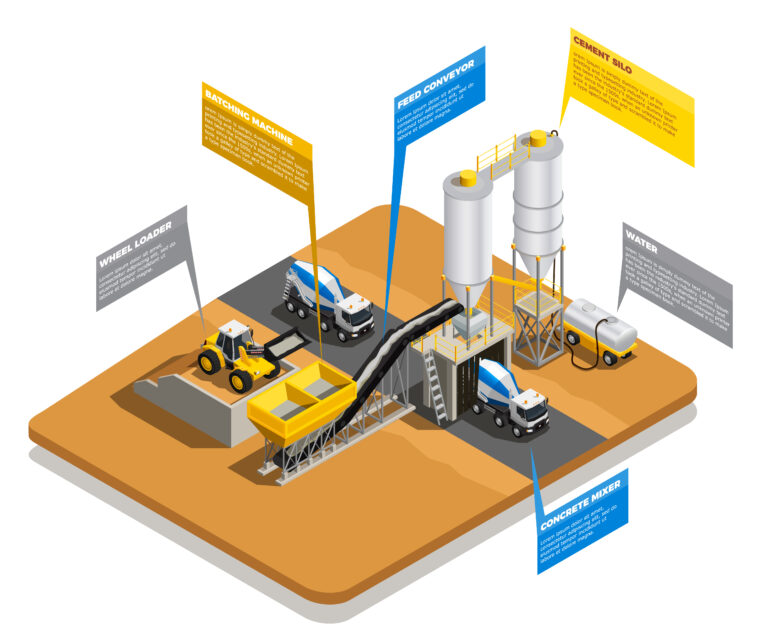The mobile concrete mixing plant is an advanced concrete equipment with a high degree of flexibility and convenience and is widely used in various civil engineering fields. This article will introduce in detail the product features, application scope, and shortcomings of mobile concrete mixing plants.
Product Features
Strong mobility: The plant of mobile type has a reasonable design and compact structure, and can be easily moved to different construction sites. This flexibility makes it a significant advantage in projects such as urban renewal and bridge construction.
Efficient and stable: The mobile concrete mixing station uses advanced mixing technology to quickly and stably prepare high-quality concrete. At the same time, it has a high degree of automation and simple operation, which greatly improves production efficiency.
Environmental protection and energy saving: The closed design of the mobile concrete mixing plant can reduce dust and noise pollution and comply with current environmental protection requirements. In addition, its energy-saving design also greatly reduces energy consumption.
Diversified configuration: The mobile concrete mixing plant can be configured according to different needs to meet the needs of different projects. For example, it can be equipped with different mixing capacities, conveyor belts, etc. to adapt to different construction conditions.
Easy maintenance: The parts of the mobile concrete mixing plant are easy to replace, the maintenance cost is low, and the service life is long.
Application scope
Construction projects: Mobile concrete mixing plants offer flexibility and efficiency on construction sites. These portable plants facilitate on-site concrete production, reducing transportation costs and time delays. Their versatility extends to various project types, from high-rise buildings and residential quarters to commercial structures. With rapid and reliable concrete supply, these plants play a pivotal role in maintaining project momentum and achieving seamless construction workflow. Additionally, their compact design and easy setup make them a practical choice for diverse construction scenarios, enhancing overall project management and success.
Road and bridge projects: The pivotal role of mobile concrete mixing plants extends beyond road and bridge projects, encompassing various facets of civil engineering. Their adaptability and efficiency make them invaluable in water conservancy projects and airport construction. In water-related endeavors,
these mobile mixing stations contribute to the development of resilient structures, ensuring the stability of dams, canals, and other water management systems. Similarly, in airport construction, the LT plant robust adaptability proves crucial for meeting the specific demands of concrete preparation in diverse and challenging environments. The ability to operate seamlessly in complex conditions underscores the versatility of mobile concrete mixing stations, solidifying their position as essential tools in advancing the success and sustainability of a wide range of civil engineering projects.
Shortcomings
Reliance on fuel power: The operation of the mobile concrete mixing plant requires fuel power, such as diesel or electricity. This may increase operating costs and have an impact on the environment. Additionally, efficient fuel management strategies and the use of eco-friendly alternatives can mitigate these concerns, promoting sustainability in construction practices.
Requires regular maintenance: Although mobile concrete batching plants are relatively easy to maintain, they still require regular maintenance and upkeep. This may require additional maintenance costs and labor investment. Implementing a proactive maintenance schedule can enhance overall reliability and minimize unexpected downtimes, contributing to long-term operational efficiency and cost-effectiveness. Regular inspections and timely repairs ensure the continuous optimal performance of the plant.
Limited by environmental conditions: The operation of the mobile concrete mixing plant is limited by certain environmental conditions. For example, in extreme weather conditions, equipment operation may be affected. Harsh climates, such as intense heat or cold, heavy rain, or strong winds, can impact the efficiency and performance of the plant. Implementing weather-resistant features and adopting adaptable technologies can help mitigate these challenges, ensuring consistent and reliable operation even in adverse environmental conditions.
Higher equipment costs: The price of mobile concrete batching plants is relatively high, which may increase investment costs. Despite its high productivity and flexibility, the initial investment can be a deterrent. However, it’s crucial to consider the long-term benefits, such as increased efficiency, reduced transportation costs, and enhanced project adaptability. Evaluating the total cost of ownership over the plant’s lifespan can provide a more comprehensive perspective, highlighting its value and return on investment in the construction and concrete production processes.
In summary, the mobile concrete mixing station has significant product features and a wide range of applications, but there are still some shortcomings. When choosing to use it, its advantages and disadvantages as well as the needs of the specific project should be fully considered. This comprehensive evaluation ensures informed decision-making, maximizing the benefits of mobile concrete mixing stations while addressing any potential challenges specific to the project or operational requirements.

